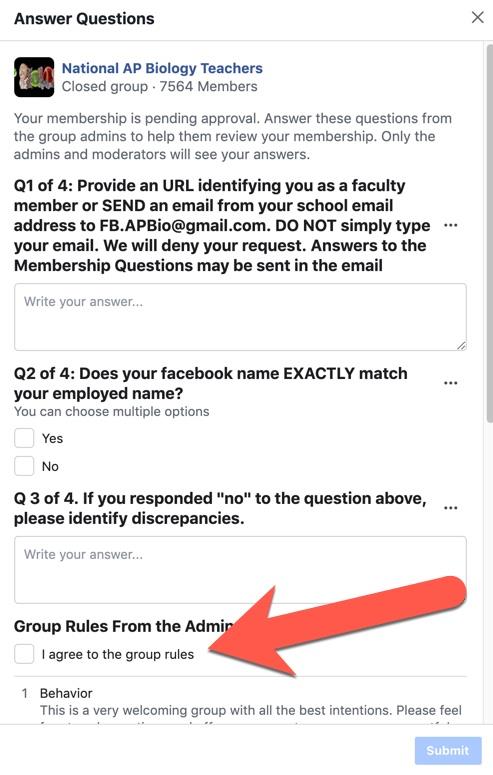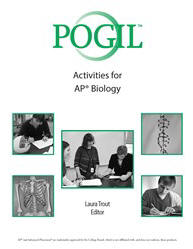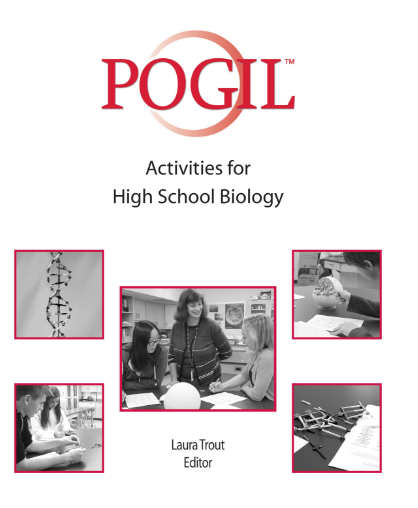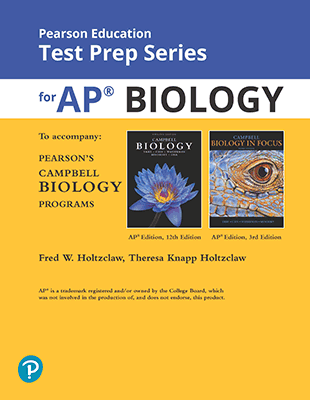Here are my suggestions from things people told me or things I figured out on my own.
NEW RESOURCES
TEACHING AP BIO - 1st TIME
COURSE AUDIT
AP CLASSROOM
COURSE
UPDATES
MY
TIPS FOR TAKING THE AP BIO EXAM
Changes to AP BIO Curriculum
starting Fall 2019
~ Content objectives are organized into 8
sequential units
~ Human body systems are no longer required (but can be
used as examples for other topics)
~ Increased emphasis on data analysis
and hypothesis testing
~ Increased emphasis on science practices
~ 6
Science practices instead of 7
Changes to 2020 AP Bio Exam
~ 60
multiple choice questions instead of 69
~ No grid in questions
(Calculations may now be included as multiple choice)
| ~ Fewer FRQs (2 long and 4 short) with focus on the following: |
| QUESTION 1:
Interpreting and Evaluating Experimental Results presents students with an authentic scenario accompanied by data in a table and/or graph. This question assesses student ability to do the following in four question parts: • Part A (1-2 pts) Describe and explain biological concepts, processes, or models. • Part B (3-4 pts) Identify experimental design procedures. • Part C (1-3 pts) Analyze data. • Part D (2-4 pts) Make and justify predictions. |
| QUESTION 2: Interpreting and evaluating experimental results with
Graphing (8-10 points) presents students with an authentic scenario accompanied by data in a table. This question assesses students’ ability to do the following in four question parts: • Part A (1-2 pts): Describe and explain biological concepts, processes, or models. • Part B (4 pts): Construct a graph, plot or chart and use confidence intervals or error bars. • Part C (1-3 pts): Analyze data. • Part D (1-3 pts): Make and justify predictions. |
|
QUESTION 3: Scientific investigations (4 points) |
|
QUESTION 3: Scientific investigations (4 points) presents students with a description of a lab investigation scenario. This question assesses students’ ability to do the following in four question parts: • Part A (1 point): Describe biological concepts or processes. • Part B (1 point): Identify experimental procedures. • Part C (1 point): Predict results. • Part D (1 point): Justify predictions |
|
QUESTION 4: Conceptual Analysis (4 points) presents students with an authentic scenario describing a biological phenomenon with a disruption. This question assesses students’ ability to do the following in four question parts: • Part A (1 point): Describe biological concepts or processes. • Part B (1 point): Explain biological concepts or processes. • Part C (1 point): Predict the causes or effects of a change in a biological system. • Part D (1 point): Justify predictions. |
|
QUESTION 5: Analyze
Model or visual Representation (4 points) presents students with a description of an authentic scenario accompanied by a visual model or representation. This question assesses students’ ability to do the following in four question parts: •Part A (1 point): Describe characteristics of a biological concept, process, or model represented visually. • Part B (1 point): Explain relationships between different characteristics of a biological concept or process represented visually. • Part C (1 point): Represent relationships within a biological model. • Part D (1 point): Explain how a biological concept or process represented visually relates to a larger biological principle, concept, process, or theory |
|
QUESTION 6: Analyze
data (4 points) presents students with data in a graph, table, or other visual representation. This question assesses students’ ability to do the following in four question parts: • Part A (1 point): Describe data. • Part B (1 point): Describe data. • Part C (1 point): Use data to evaluate a hypothesis or prediction. • Part D (1 point): Explain how experimental results relate to biological principles, concepts, processes, or theories |
Changes to
Formula sheet
~ Addition of Simpson's Diversity Index
~ Removal of Q10
-
AP Biology Lab Manual Resource Center 2019 Student/Teacher Lab Manual
-
AUDIT
-
CB Classroom Resources - Additional resources are available on the Teacher Community. See the link for features and best practices’ for instruction.
-
AP Biology Quantitative Skills Guide (.pdf/3.9MB)
Contains an overview of the quantitative skills included in the course and on the exam. Provides numerous links to online activities. -
Links to released FRQ pages: These are NOT FROM SECURE EXAMS. Every year after the exam the FRQs are posted on College Board website. Later student examples, rubrics, and data analysis are added
-
AP CLASSROOM - helps you give your students daily practice and personalized feedback throughout the year. Sign in to access AP unit guides with aligned resources, topic questions, personal progress checks, the progress dashboard, and your question bank. NOTE YOU MUST HAVE AN APPROVED AP BIO COURSE FOR ACCESS TO AP CLASSROOM.
-
AP DAILY VIDEOS- link to videos in AP CLASSROOM
 Notetaking
guides for Daily videos
By Mary Wuerth
Notetaking
guides for Daily videos
By Mary Wuerth -
AP Instructional Resources Planning for 2020-2021 School Year
Audit guidance: Once you have a valid course audit, you will have access to secure documents through the audit portal, including unreleased practice exams,
2. FIGURE OUT WHAT YOU WILL BE TEACHING
| 2020 Course & Exam Description (CED) | 2019 Lab Manual Includes teacher and student labs | College Board-Comprehensive Lab Resources |
| 2020 Formula Sheet |
A hard copy of the new CED can be ordered from the College Board store here Cost is $25. If you take a summer ASPI workshop you may receive a copy of the CED in a binder.
3. GET YOUR COURSE APPROVED College Board INFO
|
NEW CHANGES FOR 2019-2020 Course Updates Exam Updates New Resources and Supports |
 |
(Time change to Noon!) |
If you’re teaching an AP Biology course for the first
time in 2020-21, you’ll need to submit two items:
• A subject-specific AP Course Audit form
•
Documentation showing your understanding of course scope—choose 1 of 4
options:
•adopt a sample syllabus -
AP Biology Sample Syllabus 1
•adopt the AP unit guides
(on Audit site-just click and accept)
•claim identical to a colleague’s approved syllabus
•submit your own course syllabus for review
(For help creating your syllabus, sign
in to your AP Course Audit account and click on the Resource section.
NOTE: YOU CAN WRITE YOUR OWN BUT EASIER JUST TO ADOPT THE COLLEGE BOARD
UNIT GUIDES
What does it mean to “adopt” the AP Unit Guides or a pre-approved
syllabus? This simply means that the teacher has reviewed the material, is
aware of the content and skills colleges expected to see in any course
labeled “AP,” and will use the document as the starting point for their own
course plan, adapting and modifying it over time as the teacher determines
what will best enable his/her students to develop the knowledge and skills
required for college credit and placement.
In order for your school to put "AP Biology" on a student's transcript you must have an approved audit!
SOME HELPFUL LINKS
|
4. Definitely go to a summer WORKSHOP.
The College Board has lists of workshops in your area.
They should walk you through and have you do the new labs plus give you some direction on how to organize things, plan your audit, what to cover etc. They are offered for "New" and "Experienced" teachers. "New" means you are new to teaching AP Biology (not necessarily new to teaching).
With the COVID changes there are many workshops offered online now.
I have also attended several wonderful workshops not sponsored by the College Board:
Kristen Dotti (Catalyst Learning Curricula). She has 5-day AP Biology/Experimental Biology workshops in the summer on topics such "Using Labs and Statistics for AP/IB Science" and "Using critical Thinking Activities for Teaching Evolution and Genetics". She adds new ones every year. She also has case studies you can purchase, but if you can't attend one of her workshops there are sample lessons/activities on her CLC website. Watch for her presentations if you attend any of the national meetings like NABT or NSTA too.
Sample lesson plans
Join the AP BIO TEACHER COMMUNITY Select the "AP Biology Community" from the drop-down menu.
You will be in on the latest discussions, access to veterans who can answer your ?'s, new ideas, and much more.
There is also a series of informational screencasts on using the Teacher Community: http://goo.gl/NNFHq
AP BIO TEACHER COMMUNITY SITE is moderated by Lee Ferguson. It's an amazing resource
You must first register with Collage Board. Simply use your College Board professional account to log on for the first time if you haven't before. This is the same account for audits and such.
If you don't have a professional account with the College Board you can apply here.

6. REQUEST A MENTOR
Once you are a member of the National AP Biology Teachers Facebook page you can:
~ sign up for Tiffany Shoham Jones's new AP BIO teacher monthly NEWS LETTER
~ you can also request a MENTOR on the AP Bio Teacher Facebook page (tab at top of page)
7. Figure out which textbook/resources you will use.
The College Board requires your textbook to be less than 10 years old. EXAMPLE TEXTBOOK LIST
Most people use Campbell and Reece (Big Campbell), Campbell Biology in Focus (BIF), or Principles of Life (Raven)book. OpenStax is an online textbook that is also a possibility and it's free.
I used Campbell for 7 years for because that is what people suggested to me,then switched to Biology in Focus.
Students find it more readable and it came with access to Mastering Biology online resources/study links.
The consensus on the AP Bio listserve is that the Raven book is a little easier read for students, but maybe needs to be supplemented more. It is up to you.

AP BIO LAB BOOK
You do NOT have to buy lab manuals for all your students
You can download these here: 2019 Teacher Lab Manual 2019-AP BIOLOGY LAB MANUAL
You don't have to do the exact labs from the manual as long as you cover the concepts in some way.
Ex: Do the whole plant version of the transpiration lab instead of the one in the lab manual. It is way easier and less mess.
Some labs can be virtual. EX: Kim Foglia has a activity posted for doing online fruit fly crosses
You must to a minimum of 8 labs (2 for each of the Big
Ideas).
They don't all have to be inquiry, you can start with guided
labs and work up to that level.
Testing Hypotheses in AP Biology
Biology Investigative Labs: An Inquiry-Based Approach

If you have $ for extra resources I recommend the following:

POGIL Website (Process Oriented Guided Inquiry Learning)
- students work IN CLASS in small groups with the instructor acting as a facilitator.
POGILs are not for use as "homework" ! The discussion and group work is where the "learning magic" happens
Besides, the answer keys are all over the internet.
| Book with CD available from Flin Scienific | |
 |
 |
| Activities for AP Biology | Activities for High School Biology |

|
Fred and Teresa Holtzclaw
test prep guide from Savvas I would highly recommend this one!) Make sure you get the 7e edition. This is the latest version to go with the new 2020 exam changes. |
 |
There a number of other study guides out ther. The Holtzclaw 7e edition is the only one I know that has been updated for the new 2019 CED changes. |
They also have reading guide ?'s available online also for Campbell and Reece on Mastering Biology
When I used the older version of Campbell, I emailed my book rep and got access to the newer one online too so I could use the Holtzclaw reading guides there.
They are also the creators of the online AP Biology LabBench activities, also available on Mastering Biology.
There old AP Biology "Dirty Dozen" LabBench activities (modified due to loss of Flash) are still available.
Kim Foglia- ExploreBiology site - http://www.explorebiology.com/
She is considered by ALL to be the guru of AP BIO; most if not all AP teachers are using some or all of her stuff. She has Powerpoints for all the chapters, reading guides, activities, labs etc posted. Kim passed away a few years ago . . . a tragic loss to the AP BIO community. You can request access to her Teacher Vault by contacting Cheryl Hollinger (on AP BIO Teacher Facebook).
Lee Ferguson- Biology Space- Check out her AP BIO Teacher Resources
Her advice to new AP Bio teachers
Lee Ferguson's BILL My Bill Links
Shannon Muskopf- Biology Corner
David Knuffke's Google Drive docs & AP BIO Wiki & Prezi's
Mrs. Chou AP BIO website Youtube channel Labs for online learning
Tiffany Shoham Jones (Find on AP Bio Teacher Facebook page)
sign up for her New AP BIO teachers Newsletter:
Instagram LIVE Review
Quizizz review games
Cheryl Massengale- Biology Junction - http://www.biologyjunction.com/
Tons of resources, etc.
Robin Groch - Groch Biology
Kristen Dotti - Catalyst Learning- http://www.catalystlearningcurricula.com/curric_apBio.php
She sells her curriculum for about $500, but her website has sample activities you can download for free.
Plus she has great PD workshops.
Here are some links to other AP BIO TEACHER WEBSITES too
http://local.brookings.k12.sd.us/krscience/open/othersites.htm
I don't claim to be the best AP Bio teacher, but I have also put some links on my webpage to things that that helped me starting out. (Obviously you found this one... you are here!)
My Homepage
AP BIO TEACHER HELP
My Exam Prep for students MY TIPS FOR TAKING THE AP BIO EXAM
Once you get your audit approved, you will have access to the AP Classroom. Since the revamp, the College Board has released a multiple choice exam every year. These are posted on the College Board teacher login link.
These are NOT to be released, posted on a website, or allowed to leave your classroom.
AP CLASSROOM is also where there are practice AP exams and sample questions that are the "new format"
Sad to say ... if you Google hard enough you can find these out there on the web.
PAST FRQ's (free response questions) are publicly available on the AP Central website along with scoring rubrics, sample student responses, and scoring data.
2021 2020-1999 FRQ's by topic
University of Georgia has essays even farther back
http://www.csun.edu/science/biology/AP_biology/
2013 AP BIOLOGY Exam Released by College Board
This is a multiple choice exam has been released to the public by the College Board but NOT the new format.
FRQ Power words
Know what the ? is asking you to do
WRITE, WRITE, WRITE . . . Have students write as many essays as you can. You don't have to grade them all yourself. I find there is great value in having them grade their own, write rubrics of their own and compare to actual rubrics, group score, use short answer FRQ's as bell ringers or exit tickets......
Crash Course-Playlist
Amoeba Sisters-Playlist
It's OK to Be Smart- Playlist
Khan Academy- Playlist
Kristina Gremski videos
VIDEOS I LIKE BY UNIT
Campbell has 55 chapters and we have 36 weeks of school. YOU WILL NOT BE ABLE TO COVER EVERYTHING!!!!
Everyone will tell you that, but I know I need to keep reminding myself of this. It is pretty overwhelming.
TEACH WHAT YOU LOVE! Try to look for connections and teach the "Big Ideas" rather than focusing on tiny details. Follow the 2019 COURSE & EXAM DESCRIPTION (CED) from the College board.
AP Exam questions are based on combining one of the "essential knowledge" content bullets with a "learning objective" or "science practice". So look closely at LO's and SP's not just the content/facts.
What can students DO with the Biology info they know?
The new curriculum puts more focus on math/statistics/data analysis.
AP Biology Quantitative Skills Guide
HHMI Mathematics & Statistics in Biology
Testing Hypotheses in AP Biology (College Board)
Quantitative Methods in AP Biology- An Introduction to Descriptive Statistics
Training Modules -Brad Williams & Jen Pfannerstill (College Board)
I would be glad to try and answer any ?'s you have.